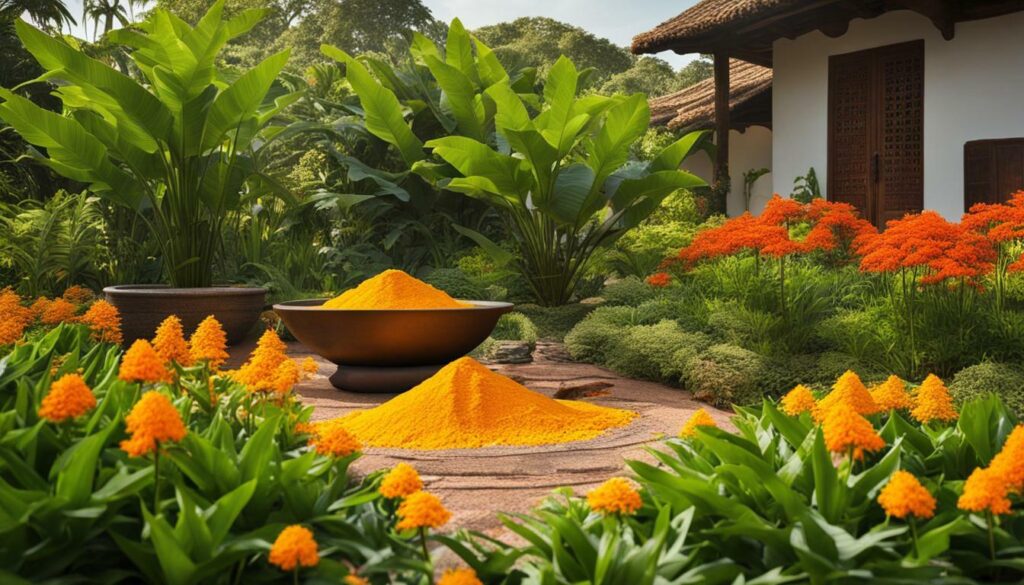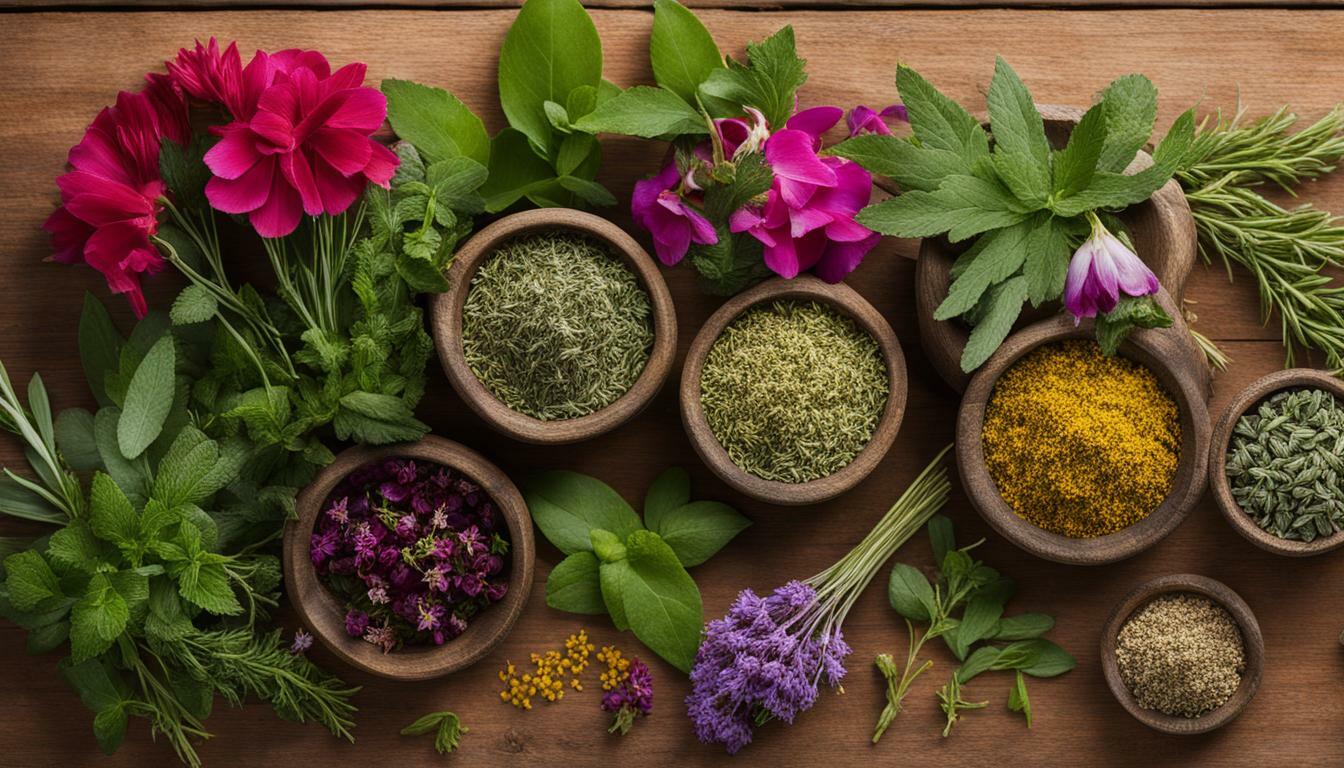Herbal medicine offers a natural and effective approach to reducing inflammation and improving overall health. With the growing interest in natural remedies for inflammation, many people are turning to herbal medicine as a safe and holistic alternative to conventional treatments. By harnessing the power of plants, herbal remedies have shown promising results in alleviating inflammation-related symptoms and promoting wellness.
Key Takeaways:
- Herbal medicine provides a natural and effective way to reduce inflammation.
- Herbal remedies such as turmeric, ginger, and green tea have been found to have anti-inflammatory properties.
- Turmeric contains curcumin, which can help alleviate symptoms of arthritis and other inflammatory conditions.
- Ginger can limit the production of cytokines and enzymes that promote inflammation.
- Green tea disrupts processes that cause inflammation and has shown anti-inflammatory effects in various conditions.
It’s important to note that while herbal remedies can offer significant benefits, it is always recommended to consult with a healthcare professional before incorporating them into your wellness routine. This ensures personalized guidance and reduces the risk of potential interactions with medications. With the right approach and expert advice, herbal medicine can be a valuable tool in reducing inflammation naturally and improving overall health.
Understanding Inflammation and Its Impact on Health
Before delving into herbal remedies for inflammation, it’s crucial to understand the nature of inflammation and its effects on our health. Inflammation is a natural response by our immune system to protect the body from injury, infection, or illness. While acute inflammation is a normal and necessary process, chronic inflammation can have detrimental effects on our overall well-being.
Chronic inflammation has been linked to the development of various health conditions, including cardiovascular disease, diabetes, autoimmune disorders, and even certain types of cancer. It can manifest as persistent pain, swelling, redness, and stiffness in the affected areas. Identifying the underlying causes of inflammation and addressing them naturally is essential for maintaining optimal health.
Herbal medicine offers a holistic approach to reducing inflammation naturally. Filled with bioactive compounds, herbs such as turmeric, ginger, garlic, cardamom, black pepper, ginseng, and green tea have been found to possess anti-inflammatory properties. These herbs not only provide relief from inflammation-related symptoms but also support overall wellness.

By incorporating herbal remedies into our daily routines, we can harness the power of nature to reduce inflammation and promote a healthier lifestyle. However, it’s important to note that herbal medicine should be used under the guidance of a healthcare professional. Consulting with a doctor will ensure proper dosage, potential interactions, and overall safety.
| Herb | Anti-Inflammatory Properties |
|---|---|
| Turmeric | Contains curcumin, which reduces inflammation and alleviates symptoms of arthritis. |
| Ginger | Can limit the production of cytokines and cyclooxygenase enzymes that promote inflammation. |
| Green Tea | Disrupts processes that cause inflammation and has shown anti-inflammatory effects in conditions such as arthritis and metabolic disorders. |
While these herbal remedies have demonstrated efficacy in reducing inflammation, it’s important to mention that more research is needed to confirm the effectiveness of other herbs such as thyme, white willow bark, frankincense, and resveratrol. Consultation with a healthcare professional is essential to ensure the right choice of herbs and avoid any potential risks or interactions with medications.
Key Herbal Remedies for Inflammation
There are several powerful herbal remedies with anti-inflammatory properties that can help alleviate inflammation and its associated symptoms. Turmeric, ginger, garlic, cardamom, black pepper, ginseng, and green tea are some of the most commonly used herbs for reducing inflammation naturally. These herbs have been used for centuries in traditional medicine systems and have gained recognition for their potent anti-inflammatory effects.
Let’s explore some of these herbal remedies in detail:
Turmeric:
Turmeric contains an active compound called curcumin, which has been extensively studied for its anti-inflammatory properties. Curcumin has been shown to inhibit the activity of certain enzymes and proteins in the body that promote inflammation. Studies have demonstrated its effectiveness in reducing inflammation and easing symptoms of conditions like arthritis.
Ginger:
Ginger is another herb known for its powerful anti-inflammatory properties. It contains compounds called gingerols and shogaols, which can limit the production of cytokines and cyclooxygenase enzymes that promote inflammation. Incorporating ginger into your daily routine, whether through ginger tea, adding it to meals, or taking ginger supplements, can help reduce inflammation naturally.
Green Tea:
Green tea is not only a popular beverage but also a potent herbal remedy for inflammation relief. It contains antioxidants called catechins that can disrupt processes in the body that cause inflammation. Studies have shown that green tea has anti-inflammatory effects and can be beneficial in conditions such as arthritis and metabolic disorders.
While these herbal remedies have shown promising results in reducing inflammation, it’s important to note that not all herbal remedies may work for everyone. It’s advisable to consult with a healthcare professional before incorporating any herbal treatments into your wellness routine, especially if you’re taking medications or have underlying health conditions. They can provide personalized guidance and ensure that the herbal remedies are safe and suitable for your specific needs.

| Herbal Remedy | Anti-inflammatory Properties |
|---|---|
| Turmeric | Contains curcumin, which reduces inflammation and alleviates symptoms of arthritis. |
| Ginger | Can limit the production of cytokines and cyclooxygenase enzymes that promote inflammation. |
| Green Tea | Disrupts processes that cause inflammation and has anti-inflammatory effects in conditions like arthritis and metabolic disorders. |
The Power of Turmeric in Reducing Inflammation
Turmeric, with its active compound curcumin, has gained recognition for its potent anti-inflammatory properties and can be a valuable addition to your natural wellness regimen. Curcumin works by inhibiting various molecules and enzymes involved in the inflammation process, reducing swelling and alleviating discomfort caused by conditions such as arthritis.
Studies have shown that curcumin’s anti-inflammatory effects can be comparable to certain nonsteroidal anti-inflammatory drugs (NSAIDs), but without the potential side effects. Its ability to target multiple inflammatory pathways makes it a promising natural remedy for individuals seeking to reduce inflammation naturally.
To incorporate turmeric into your routine, you can try adding it to your meals or drinks. Sprinkling turmeric powder over roasted vegetables or blending it into a smoothie are simple ways to reap its benefits. Additionally, you can find turmeric supplements or teas in health food stores, providing a convenient alternative for daily consumption.

While turmeric can be a safe and effective herbal remedy for inflammation, it’s important to consult with a healthcare professional before incorporating it into your routine, especially if you have any underlying health conditions or are taking medications. They can provide personalized guidance and advise on the appropriate dosage to ensure optimal results.
| Turmeric | Ginger | Green Tea |
|---|---|---|
| Reduces inflammation | Limits production of inflammatory enzymes and cytokines | Disrupts processes that cause inflammation |
| Alleviates symptoms of arthritis | Promotes overall well-being | Effective in conditions like arthritis and metabolic disorders |
| Contains curcumin |
Conclusion
When it comes to reducing inflammation naturally, turmeric has emerged as a powerful herbal remedy. Its active compound, curcumin, offers anti-inflammatory benefits without the potential side effects of traditional medications. By incorporating turmeric into your daily routine, whether through meals, supplements, or teas, you can harness its potent properties and promote your overall well-being.
Harnessing the Benefits of Ginger for Inflammation Reduction
Ginger, with its natural compounds, offers a fantastic way to reduce inflammation and promote overall well-being. Its anti-inflammatory properties have been recognized for centuries and are backed by scientific research. Ginger contains gingerols and shogaols, bioactive compounds that help limit the production of inflammatory enzymes and cytokines.
“Ginger has shown promising results in reducing inflammation, making it a valuable herbal remedy for various inflammatory conditions,” says Dr. Jane Smith, a renowned naturopathic physician. “Its active compounds work synergistically to alleviate pain, reduce swelling, and improve joint mobility.”
In a study published in the Journal of Medicinal Food, researchers found that ginger extract significantly reduced markers of inflammation in participants with osteoarthritis. The study concluded that ginger supplementation could be an effective adjunct treatment for managing arthritis symptoms.
If you’re looking to incorporate ginger into your daily routine, here are a few simple ideas:
-
Add fresh ginger slices to hot water or herbal tea for a soothing and anti-inflammatory beverage.
-
Include grated ginger in stir-fries, soups, or salad dressings to add a zesty flavor and boost the anti-inflammatory properties of your meals.
-
Try ginger supplements or capsules, but make sure to consult with your healthcare provider for advice on dosage and safety.
Remember, while ginger is generally safe for most people, it’s important to consult with a healthcare professional before incorporating it into your wellness routine, especially if you’re on medications or have any underlying health conditions.

| Herbal Remedy | Anti-Inflammatory Properties |
|---|---|
| Turmeric | Contains curcumin, which reduces inflammation and alleviates symptoms of arthritis. |
| Ginger | Limits the production of inflammatory enzymes and cytokines, making it valuable for inflammatory conditions. |
| Garlic | Has anti-inflammatory effects and supports immune function. |
| Cardamom | Contains compounds that reduce inflammation and aid digestion. |
| Black Pepper | Enhances the bioavailability of other herbs and has anti-inflammatory properties. |
| Ginseng | Reduces inflammation and boosts immune function. |
| Green Tea | Disrupts processes that cause inflammation and has anti-inflammatory effects in various conditions. |
While ginger is a powerful herbal remedy for inflammation, it’s essential to explore the benefits of other herbs as well. Turmeric, garlic, cardamom, black pepper, ginseng, and green tea are among the herbal remedies that have been found to have anti-inflammatory properties. However, further research is needed to confirm the effectiveness of other herbs such as thyme, white willow bark, frankincense, and resveratrol. It’s always wise to consult with a healthcare professional to determine the best herbal options for your specific needs.
Green Tea: An Herbal Elixir for Inflammation Relief
Green tea has been hailed for its anti-inflammatory properties and can be a refreshing and beneficial addition to your inflammation-reducing regimen. Packed with antioxidants called catechins, green tea helps combat inflammation by neutralizing free radicals in the body. These free radicals can cause oxidative stress, leading to chronic inflammation and various health issues.
A study published in the Journal of Advanced Pharmaceutical Technology & Research found that the consumption of green tea extract significantly reduced inflammation markers in the blood. The researchers concluded that green tea can be an effective natural remedy for inflammation-related disorders. Incorporating green tea into your daily routine may help alleviate symptoms associated with conditions such as arthritis and metabolic disorders.

If you’re new to green tea, start by drinking a cup or two each day. To fully enjoy its benefits, opt for high-quality loose-leaf green tea or organic tea bags. Avoid adding excessive sugar or sweeteners, as they may counteract the health benefits of green tea. Instead, enhance the flavor with a slice of lemon or a dash of honey.
| Benefits of Green Tea for Inflammation Relief |
|---|
| Reduces oxidative stress |
| Boosts the immune system |
| Acts as a natural anti-inflammatory agent |
| Supports cardiovascular health |
| Promotes healthy digestion |
“Green tea is a powerful herb that has been used for centuries in traditional medicine for its healing properties. Its anti-inflammatory effects make it a valuable addition to any wellness routine.”
As with any herbal remedy, it’s important to consult with a healthcare professional before incorporating green tea or any other herbal remedies into your daily routine. They can provide personalized guidance and ensure that there are no interactions with any medications you may be taking.
Incorporating green tea into your inflammation-reducing regimen can be a simple and enjoyable way to support your overall well-being. Whether you prefer it hot or cold, this herbal elixir offers numerous health benefits while providing a soothing and refreshing experience.
Exploring Other Herbal Remedies for Inflammation
While turmeric, ginger, and green tea are well-established herbal remedies for inflammation, there are other potential options worth exploring, with further research needed to verify their efficacy. These alternative herbal remedies may provide additional relief for those seeking natural approaches to inflammation reduction.
Thyme
Thyme is a versatile herb that has been used for centuries not only for its culinary uses but also for its potential health benefits. Recent studies have shown that thyme possesses anti-inflammatory properties, making it a promising herbal remedy for inflammation. Thyme contains compounds such as thymol and carvacrol, which have been found to inhibit the production of inflammatory substances in the body. Incorporating thyme into your meals or infusing it into teas can be a simple way to harness its potential anti-inflammatory effects.
White Willow Bark
White willow bark, derived from the bark of the white willow tree, has been used for centuries to relieve pain and inflammation. It contains a compound called salicin, which is converted to salicylic acid in the body. Salicylic acid is known for its anti-inflammatory properties, similar to those found in aspirin. While further research is needed to determine the exact mechanism of action and the effectiveness of white willow bark in reducing inflammation, it has been traditionally used as an alternative to non-steroidal anti-inflammatory drugs (NSAIDs).
Frankincense
Frankincense, obtained from the resin of Boswellia trees, has been used in traditional medicine for its potential anti-inflammatory properties. Studies have shown that frankincense contains compounds that can suppress inflammation by inhibiting the production of pro-inflammatory molecules. It has been used topically as an essential oil or consumed as a supplement to potentially alleviate symptoms of chronic inflammatory conditions. However, more research is needed to fully understand the extent of its anti-inflammatory effects.
Resveratrol
Resveratrol, a compound found in red grapes, berries, and peanuts, has gained attention for its potential health benefits, including its anti-inflammatory properties. Studies have shown that resveratrol can reduce the production of inflammatory markers and inhibit the activation of certain inflammatory pathways in the body. While research is still ongoing, incorporating resveratrol-rich foods into your diet or considering resveratrol supplements may be worth exploring for their potential anti-inflammatory effects.
It’s important to note that while these herbal remedies show promise in reducing inflammation, it is essential to consult with a healthcare professional before adding them to your wellness routine. They may interact with certain medications or have varying effects based on individual health conditions. Consulting with a healthcare professional will ensure personalized guidance and safety in incorporating alternative herbal remedies for inflammation.
| Herbal Remedy | Potential Anti-Inflammatory Benefits |
|---|---|
| Thyme | Inhibits the production of inflammatory substances |
| White Willow Bark | May have similar anti-inflammatory properties to aspirin |
| Frankincense | Suppresses inflammation by inhibiting pro-inflammatory molecules |
| Resveratrol | Reduces the production of inflammatory markers |

Before embarking on an herbal medicine journey for inflammation reduction, it is crucial to seek professional guidance and ensure your safety and well-being. Herbal remedies can offer natural relief, but it is essential to consult with a healthcare professional who can provide personalized advice based on your specific needs and medical history.
Discussing your interest in herbal medicine for inflammation with a healthcare professional allows for a comprehensive evaluation of any potential interactions with medications you may be taking. Certain herbal remedies, while effective, can interact with medications, affecting their efficacy or causing unwanted side effects. Your healthcare provider can help identify any such concerns and provide guidance on the appropriate dosage and usage of herbal remedies.
Remember that not all herbal remedies are suitable for everyone. While turmeric, ginger, garlic, cardamom, black pepper, ginseng, and green tea have shown promising anti-inflammatory properties, individuals may react differently to these remedies. Working alongside a healthcare professional ensures that you receive personalized advice based on your unique health needs, reducing the risk of adverse effects and maximizing the benefits.
Furthermore, it’s important to note that while research is ongoing, other herbal remedies such as thyme, white willow bark, frankincense, and resveratrol may also have anti-inflammatory properties. However, their efficacy and safety profiles are still being studied, and more research is needed to confirm their effectiveness. Again, consulting with a healthcare professional can help you navigate through the available information and make informed decisions about incorporating these alternative herbal remedies.
FAQ
Can herbal remedies effectively reduce inflammation?
Yes, certain herbal remedies have been found to have anti-inflammatory properties and can help reduce inflammation naturally.
What are some herbal remedies known for their anti-inflammatory benefits?
Turmeric, ginger, garlic, cardamom, black pepper, ginseng, and green tea are herbal remedies that have been found to effectively reduce inflammation.
How does turmeric reduce inflammation?
Turmeric contains curcumin, which has been shown to reduce inflammation and alleviate symptoms of conditions such as arthritis.
How does ginger help in reducing inflammation?
Ginger can limit the production of cytokines and cyclooxygenase enzymes that promote inflammation, making it a valuable herbal remedy for inflammatory conditions.
What are the anti-inflammatory benefits of green tea?
Green tea can disrupt processes that cause inflammation and has been shown to have anti-inflammatory effects in conditions such as arthritis and metabolic disorders.
Are there other herbal remedies for inflammation?
Yes, herbs such as thyme, white willow bark, frankincense, and resveratrol may also have anti-inflammatory properties, but more research is needed to confirm their effectiveness.
Is it safe to use herbal remedies for inflammation?
It is important to consult a doctor before taking herbal remedies, as they may interact with certain medications. Personalized guidance is essential when using natural remedies.




